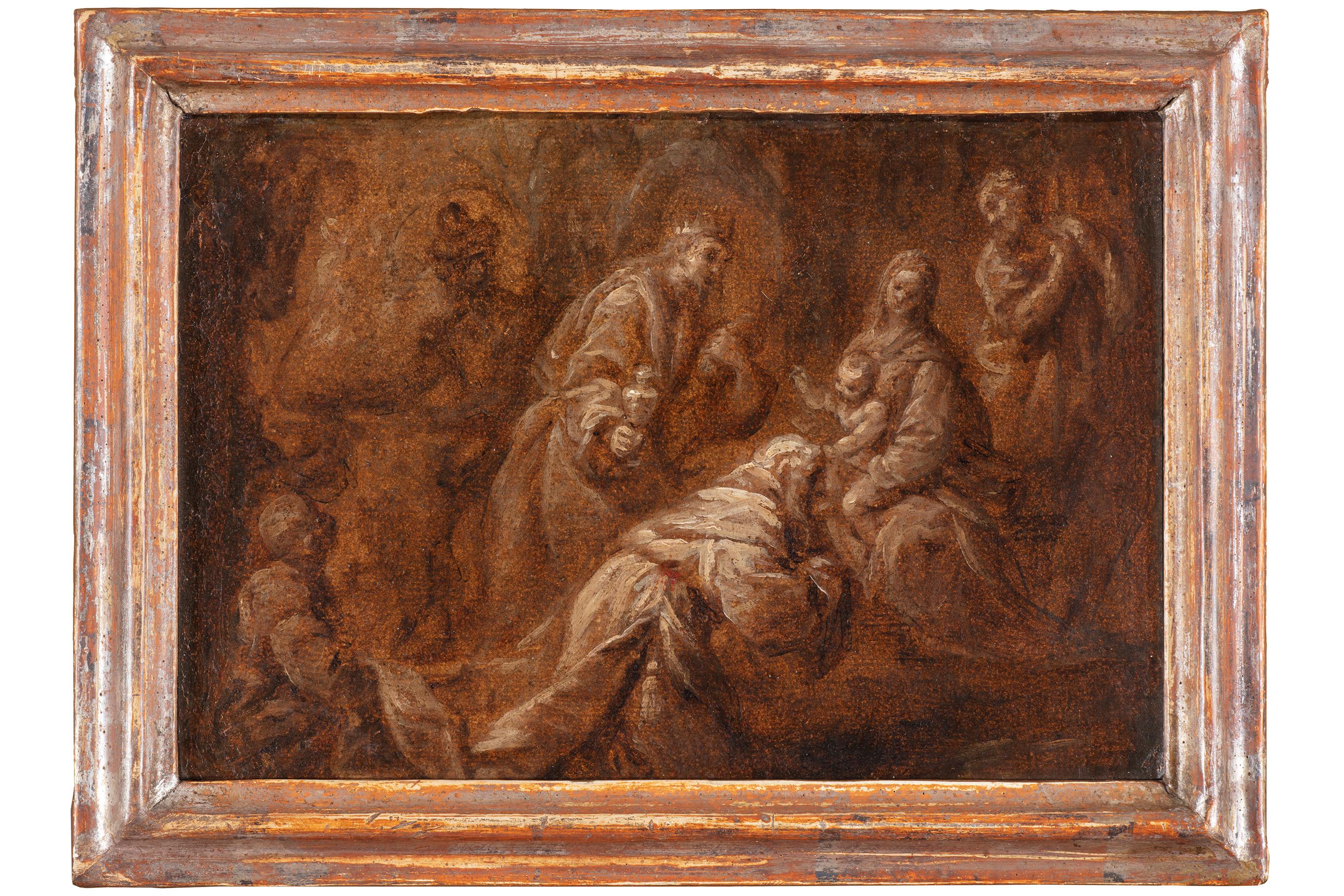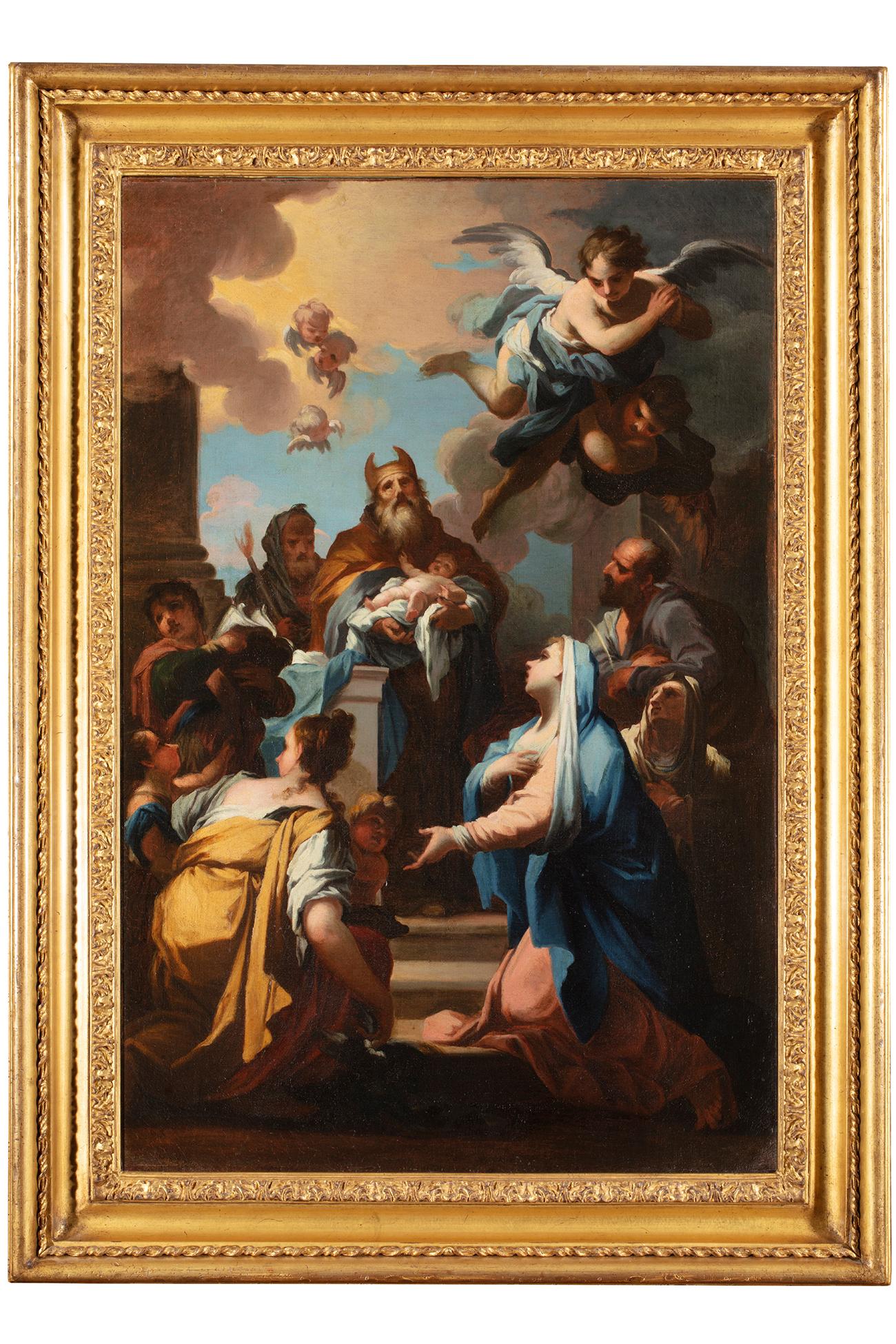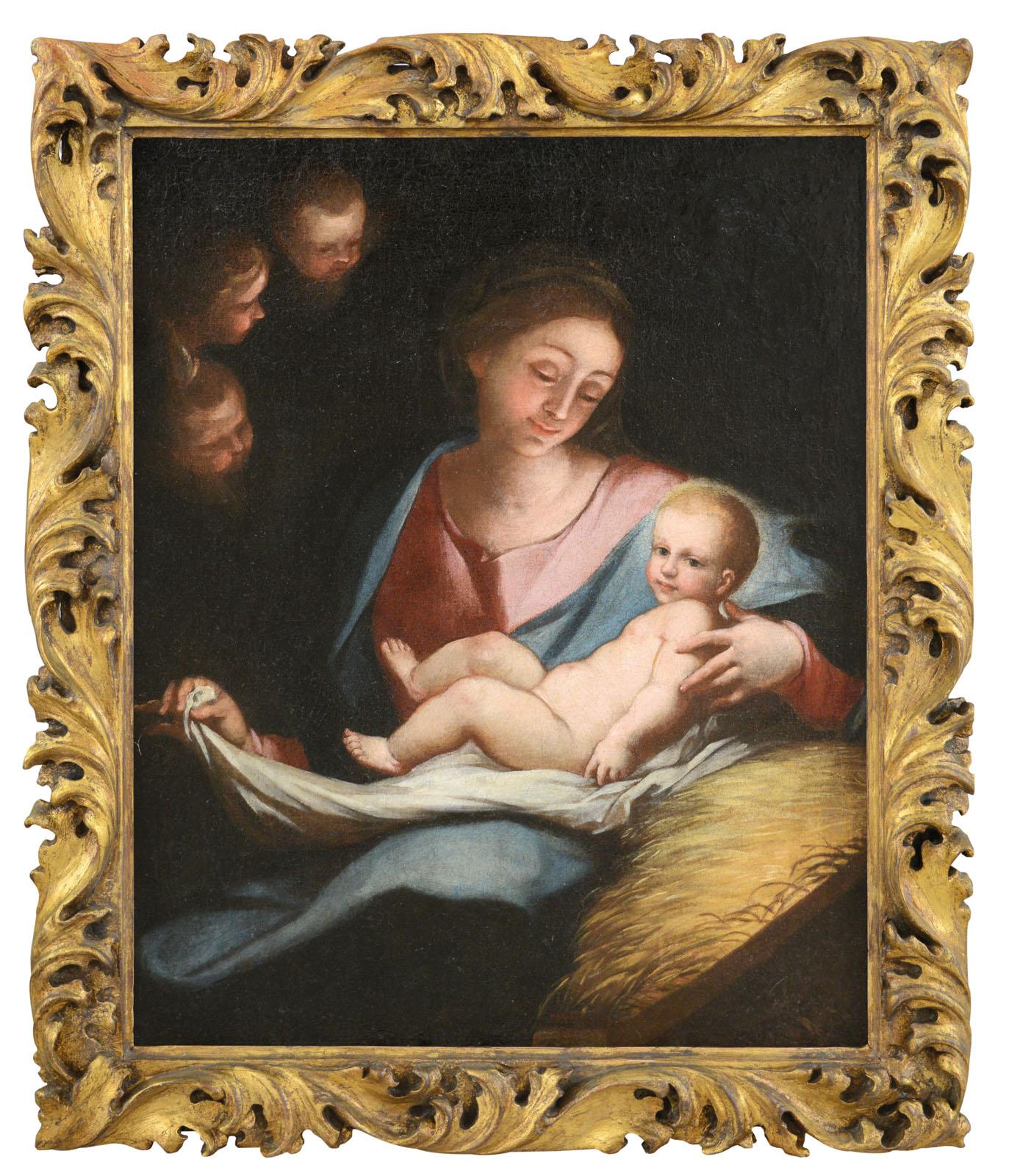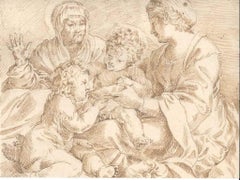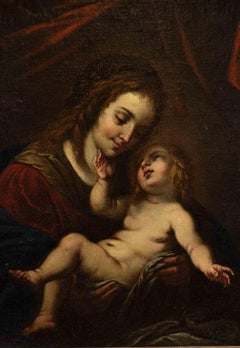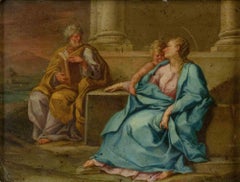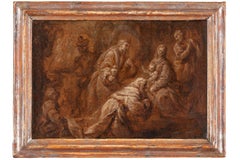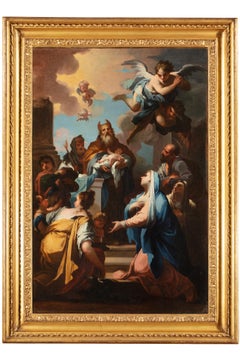Items Similar to The Adoration -Painting by Giuseppe Assereto - 1630
Want more images or videos?
Request additional images or videos from the seller
1 of 7
Giuseppe AsseretoThe Adoration -Painting by Giuseppe Assereto - 16301630
1630
$18,391.42
£13,599.88
€15,400
CA$25,262.40
A$28,090.34
CHF 14,705.80
MX$343,128.69
NOK 184,792.83
SEK 173,834.69
DKK 117,259.14
About the Item
The Adoration is an original modern artwork realized by Giuseppe Assereto (died in Genoa in 1650) in the first half of the 17th Century.
Original Oil Painting on Canvas.
A 19th Century style gilded wood frame is included.
The Autograph of the work was confirmed by Camillo Manzitti.
Very good conditions. The frame is in excellent conditions too.
Reference:
C. Marcenaro, Pittori genovesi a Genova nel '600 e nel '700, Genova 1969, pp. 134 ; 135, n. 55.
Z. Wazbinski, Un Quadro Caravaggesco Di Gioacchino Assereto, in Prospettiva, n. 26, 1981, pp. 60 ; 63.
F. R. Pesenti, La Pittura in Liguria. Artisti del primo Seicento, Genova 1986, p. 397, nota 23.
A. Gesino, Tracce di Matthias Stom nel collezionismo tra la Sicilia e Genova, in Caravaggio e i genovesi, catalogo della Mostra a cura di A. Orlando, Genova 2019, pp. 182 ; 195.
The Adoration is an excellent example of the XVII Century Italian Painting. The style of the work denotes the suggestive influence of Assereto father's mature production, when influenced by Mathias Stom (Amersfoort, about 1600 - Sicily, after 1650) expresses dark sensibilities in a southern Italian style. In his works, however, there is an accentuated naturalism and interesting similarities with the production of Giovanni Benedetto Castiglione. Gioacchino Assereto died in 1650, while, according to Soprani, he was intent on painting a Last Supper for the oratory of S. Giacomo della Marina. In our case, however, there is a more accentuated naturalism and interesting similarities with the production of Giovanni Benedetto Castiglione. The canvas finds specific comparisons with other compositions by the master, in particular with that of the Emilian private collection made known by Tiziana Zennaro, but we must also remember here the canvases of the same subject already published as autographs by Assereto by Wazbinski in 1981 and Caterina Marcenaro in the catalogue of the 1969 exhibition, preserved at the Zeromski Muzeum in Poland and in a private Genoese collection. The painting reveals pictorial contempt of higher quality and in substance different from the Emilian version, finding better points of comparison with the Genoese editorial staff, in particular if we analyze the Infant Jesus and the faces of the figures. These clues consequently lead to date the work around 1650 and probably performed when Giuseppe carried out his activity in his paternal workshop and with him he experienced the fascinating nocturnal settings.
The work has been created by Giuseppe Assereto (best known as "the Master of the Oratory of San Giacomo alla Marina") son and pupil of the more famous Gioacchino Assereto is also known as the "Master of the Oratory of San Giacomo alla Marina", which houses his most famous painting depicting the Preaching of San Giacomo (around 1650). Small biographical information is probably due to his short life.
- Creator:
- Creation Year:1630
- Dimensions:Height: 23.82 in (60.5 cm)Width: 29.34 in (74.5 cm)Depth: 1.58 in (4 cm)
- Medium:
- Movement & Style:
- Period:1630-1639
- Condition:Insurance may be requested by customers as additional service, contact us for more information.
- Gallery Location:Roma, IT
- Reference Number:Seller: T-1224391stDibs: LU650310101032
About the Seller
4.9
Platinum Seller
Premium sellers with a 4.7+ rating and 24-hour response times
1stDibs seller since 2017
7,681 sales on 1stDibs
Typical response time: 3 hours
- ShippingRetrieving quote...Shipping from: Roma, Italy
- Return Policy
Authenticity Guarantee
In the unlikely event there’s an issue with an item’s authenticity, contact us within 1 year for a full refund. DetailsMoney-Back Guarantee
If your item is not as described, is damaged in transit, or does not arrive, contact us within 7 days for a full refund. Details24-Hour Cancellation
You have a 24-hour grace period in which to reconsider your purchase, with no questions asked.Vetted Professional Sellers
Our world-class sellers must adhere to strict standards for service and quality, maintaining the integrity of our listings.Price-Match Guarantee
If you find that a seller listed the same item for a lower price elsewhere, we’ll match it.Trusted Global Delivery
Our best-in-class carrier network provides specialized shipping options worldwide, including custom delivery.More From This Seller
View AllMadonna della Scodella
Located in Roma, IT
Madonna della Scodella is an original drawing (black pencil, pen and ink on laid paper) by an exponent of the Italian school of the eighteenth century.
In excellent conditions: almo...
Category
19th Century Old Masters Figurative Drawings and Watercolors
Materials
Ink
Virgin with Child - Painting by Theodor Mathon - 17th Century
Located in Roma, IT
Virgin Mary and Jesus is an original old masters' artwork realized by the Flemish painter Theodor Mathon (1606-1676) in the 17th century.
Mixed ...
Category
17th Century Old Masters Figurative Paintings
Materials
Oil
Bucolic Scene - Oil on Canvas Attributed to Michelangelo Ricciolini - 1705
By Michelangelo Ricciolini
Located in Roma, IT
Bucolic Scene is a majestic oil painting on canvas attributed to the painter Michelangelo Ricciolini.
Includes a frame: 142 x 173 cm.
Good conditions, except for little loss of color on the canvas.
The beautiful painting represents a bucolic scene where shepherds, women, and children are conversing in a resting moment. The scene is set in an open space, probably a wood.
Michelangelo Ricciolini (1654 – 1715) was an Italian painter of the Baroque period. He first studied in Rome under Angelo Canini; he then joined the large studio of Carlo Maratta. He painted various works in Rome, including the dome of Santa Rita...
Category
Early 1700s Figurative Paintings
Materials
Oil
Religious Scene - Painting - 19th Century
Located in Roma, IT
Religious scene is a modern artwork realized by Artist of 19th Century.
Mixed colored oil painting on metal board
Fair conditions due to the time (some stains diffused).
Incudes f...
Category
19th Century Modern Figurative Paintings
Materials
Oil
The Poor Widow's Offer - Oil Painting - 17th Century
Located in Roma, IT
The Poor Widow's Offer is an old master artwork realized by a follower of Marten de Vos (Antwerp 1532-1603) in the half of 17th Century.
Mixed colored oil on canvas.
Inscribed bottom right “Jesus Laudat Pauperculam […]”.
The painting, whose subject is taken from the Gospel episode of the Offering of the poor widow (Mk., 12, 38-44; Lk., 21, 1-4), depicts Jesus in the Temple...
Category
17th Century Modern Figurative Paintings
Materials
Paint, Oil
The Market - Painting - 18th Century
Located in Roma, IT
The Market is an original old master artwork realized in the 18th century by an Anonymous Flemish artist.
Oil painting on canvas. The artwork depicts a bargaining scene at the marke...
Category
18th Century Baroque Figurative Paintings
Materials
Oil
You May Also Like
17th Century by Giuseppe Nuvolone Adoration of the Magi Oil on paper and canvas
Located in Milano, Lombardia
Giuseppe Nuvolone (Milan, 1619 – 1703)
Title: Adoration of the Magi
Medium: Oil on paper applied to canvas
Dimensions: without frame 16.5 x 24 cm – with frame 22 x 29 cm
Antique sha...
Category
17th Century Old Masters Figurative Paintings
Materials
Paper, Canvas, Oil
Adoration of the Shepherds, c. 1620.
Located in Milan, IT
Oil on Canvas. Venetian school of the 17th century.
Looking to the models popularized by Jacopo Bassano, the painting presents a scene rich in figures and contour elements typical of...
Category
17th Century Other Art Style Figurative Paintings
Materials
Oil
18th Century by Matteo Bonechi Presentation of Jesus Painting Oil on Canvas
Located in Milano, Lombardia
Matteo Bonechi (Florence, Italy, 1669 - Florence, Italy, 1756)
Title: Presentation of Jesus
Medium: Oil on canvas
Dimensions: without frame 75 x 49 cm – with frame 89.5 x 65 cm
Shaped, carved and gilded wooden box frame
Expertise by Sandro Bellesi, Professor and art historian
Fairs: The International Biennial of Antiques in Florence 2022 (BIAF, Biennale Internazionale dell’Antiquariato di Firenze)
Publications: Bozzetti, modelletti, sketches: dalla collezione di Giorgio Baratti (From the Giorgio Baratti Collection) curated by Anna Orlando, Agnese Marengo and Annalisa Scarpa, Genova, 2022, pp. 20, 21.
The present painting is a very interesting testimony of the creative process of Matteo Bonechi, one of the leading artists on the Tuscan art scene in the early 18th century. The canvas in question is in fact the last preparatory model made by Bonechi before he executed an altarpiece for the church of San Filippo Neri in Cortona in 1716. The scene presented here is that of the Presentation of Jesus, when, forty days after his birth, the child is ransomed through an offering in the temple and placed in the hands of Simeon, who prophesies his future: the coming of the Messiah...
Category
Early 18th Century Old Masters Figurative Paintings
Materials
Oil, Canvas
Adoration Magi Jan Van Der Straet Paint Oil on canvas Old master 16th Century
Located in Riva del Garda, IT
Jan Van der Straet, known as Giovanni Stradano (Bruges 1523 - Florence 1605), Workshop of
The Adoration of the Magi
late 16th century - early 17th century
oil painting on canvas
Mea...
Category
16th Century Old Masters Paintings
Materials
Oil
$7,327 Sale Price
20% Off
Adoration Shepherds Von Achen Paint oil on canvas 17th Century Old master Art
Located in Riva del Garda, IT
Hans (or Johann) von Achen (Cologne 1552 - Prague 1615) workshop
Adoration of the Shepherds
Oil on canvas
112 x 90 cm./ Framed 125 x 102 cm.
The painting that we are happy to prese...
Category
17th Century Old Masters Paintings
Materials
Oil
$8,694 Sale Price
20% Off
Madonna Maria Piola Paint Oil on canvas 17/18th Century Old master Religious
Located in Riva del Garda, IT
Anton Maria Piola (Genoa, 1654 - 1715) circle
Madonna and Child
Genoese school of the second half of the 17th century
Oil on canvas
93 x 74 cm.- In antique frame 110 x 92 cm.
(Work with expertise by Dr. Arabella Cifani)
In the pleasing work proposed, depicting a classical Nativity scene, the Madonna is immortalised in adoration as she gently holds the sheet on which the Child is lying, with a gesture of protection and pride that facilitates an atmosphere of intimate recollection, in addition to the presence of three cherubs at the top.
The stylistic analysis of the canvas can easily be traced back to a painter of the Genoese school and active during the 17th century, specifically with the devotional works from the workshop of Domenico Piola (Genoa, 1627-1703), an absolute protagonist of Genoese Baroque culture.
Piola was the owner of the most important city painting workshop of the time, known as 'Casa Piola', where his sons Paolo Gerolamo and Anton Maria also collaborated.
His production, which specialised in a type of highly decorative, profane and allegorical paintings, destined for the decoration of Genoese patrician palaces, also included a refined series of works of a religious nature.
In particular, the style of our beautiful breast painting...
Category
17th Century Old Masters Paintings
Materials
Oil
$8,073 Sale Price
20% Off
More Ways To Browse
17th Century Italian Drawings
Italian Painting 1600
Genoa Italy Painting
Adoration Paintings
The Last Supper Art
Antique Autographs
Giovanni S Paintings
Oil Paintings 1600
1600 Oil Paint
Oil Painting Last Supper
Wood Last Supper
Antique Last Supper
Jesus Last Supper
Antique Last Supper Painting
Giuseppe Castiglione
Oil Painting Liguria
Stom Oil
Charcoal Drawing Of Man
